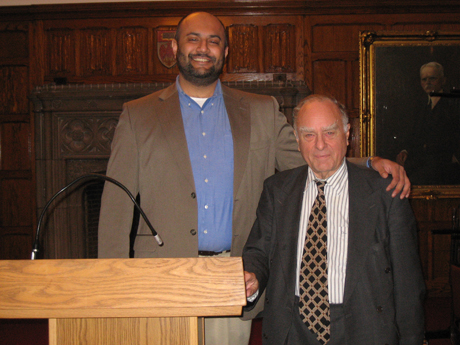| Sun | Mon | Tue | Wed | Thu | Fri | Sat |
|---|---|---|---|---|---|---|
| 1 | 2 | 3 | 4 | 5 | ||
| 6 | 7 | 8 | 9 | 10 | 11 | 12 |
| 13 | 14 | 15 | 16 | 17 | 18 | 19 |
| 20 | 21 | 22 | 23 | 24 | 25 | 26 |
| 27 | 28 | 29 | 30 | 31 |
CATEGORIES
RECENT ENTRIES
BLOG ROLL
Muslim grassroots
"Many American and British non-Muslims believe that Islam and democracy are incompatible," said Amédée Turner, a former member of the European Parliament for Britain and the Queen’s Counsel. Turner, who also advised the Macedonian Parliament in 2001 on democratic procedures, presented to a dozen Divinity students the results of his recent study “Muslim Grassroots in the West Discuss Democracy,” which he carried out in 2005-06 while sitting on the Advisory Council of the Anglican Observer to the United Nations. Turner's talk in Swift Hall last Thursday was one stop on a tour including the World Affairs Council of America in St. Louis, the Middle East Institute in DC, and the London Houses of Parliament.
The study gathered 400 Muslims from different U.S. and British communities into 38 anonymous round-table discussions to consider whether democracy and Islam are compatible. The groups, set up by local Anglican and Episcopalian clerics, included "business and professional people, school teachers, their spouses, and students." For his study Turner defined democracy as one person, one vote; secret ballots; and government that follows the electorate. The groups were not asked to come to an agreement or to vote but only to discuss. “On the question of democracy,” Turner found, “they spoke with a unified voice,” agreeing that there is no clash between their religion and democracy. Their statements, compiled in a 90-page report recommended by the United Nations Alliance of Civilizations, echo Winston Churchill: "Democracy is the worst form of government except all the others that have been tried.”
Democracy is compatible with Islam, said the participants, as long as the government doesn't contradict the Qur'an. In the Islamic text, "most punishment is in hell,” Turner pointed out, “so it’s not a problem for a democratic parliament.” Certain rules about modesty for women, he noted, and the requirement to cut off a thief’s hand could come into conflict with a democratic government.

After Turner spoke, Graham School Asian-classics instructor Omer Mozaffar addressed those two potential conflicts of women and thieves. Less than 10 percent of the text of the Qur'an deals with legal matters, Mozaffar said. “The majority is focused on what we would call worldview, not law or governance. There’s a body of law that developed after the text, so the text may say, ‘Cut off the hand of a thief,’ but can that mean imprison them? What is literal and what is metaphorical?” There is no legal or scholarly consensus on these questions, he added; applying Qur'anic laws to the modern day “is a community project" that is "democratic in spirit.”
Shira Tevah, ’09
October 20, 2008
